|
|
|
Sort Order |
|
|
|
Items / Page
|
|
|
|
|
|
|
| Srl | Item |
| 1 |
ID:
139022
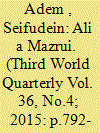

|
|
|
|
|
| Summary/Abstract |
In 2013, Ali A Mazrui gave a lecture in Muscat (Oman) about Barack Obama, the 44th president of the USA, in which he suggested that Obama was a great man but not yet a great president. Mazrui said we would have to wait and see if Obama would become a great president. I think Mazrui was right. But we would not have to wait any longer to say: ‘Ali A Mazrui: a great man, a great scholar’. On 12 October 2014, Ali Mazrui passed away at the age of 81. He was indeed a great man and an extraordinary scholar. This essay is a special tribute to him.
|
|
|
|
|
|
|
|
|
|
|
|
|
|
|
|
| 2 |
ID:
139016
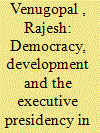

|
|
|
|
|
| Summary/Abstract |
This paper examines the developmental causes and consequences of the shift from a parliamentary to a semi-presidential system in Sri Lanka in 1978, examining its provenance, rationale and unfolding trajectory. Drawing on a wide range of sources, it sets out an argument that the executive presidency was born out of an elite impulse to create a more stable, centralised political structure to resist the welfarist electoral pressures that had taken hold in the post-independence period, and to pursue a market-driven model of economic growth. This strategy succeeded in its early years, 1978–93, when presidents retained legislative control, maintained a strong personal commitment to market reforms and cultivated alternative sources of legitimacy. In the absence of these factors, the presidency slipped into crisis from 1994–2004 as resistance to elite-led projects of state reform mounted and as the president lost control of the legislature. Between 2005–14, the presidency regained its power, but at the cost of abandoning its original rationale and function as a means to recalibrate the elite–mass power relationship to facilitate elite-led reform agendas.
|
|
|
|
|
|
|
|
|
|
|
|
|
|
|
|
| 3 |
ID:
139019
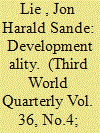

|
|
|
|
|
| Summary/Abstract |
The instituted order of development is changing, creating new power mechanisms ordering the relationship between donor and recipient institutions. Donors’ focus on partnership, participation and ownership has radically transformed the orchestration of aid. While the formal order of this new aid architecture aimed to alter inherently asymmetrical donor–recipient relations by installing the recipient side with greater freedom and responsibility, this article – drawing on an analysis of the World Bank’s Poverty Reduction and Strategy Paper (PRSP) model and its partnership with Uganda – demonstrates how lopsided aid relations are being reproduced in profound ways. Analysed in terms of developmentality, the article shows how the donor aspires to make its policies those of the recipient as a means to govern at a distance, where promises of greater inclusion and freedom facilitate new governance mechanisms enabling the donor to retain control by framing the partnership and thus limiting the conditions under which the recipient exercises the freedom it has been granted.
|
|
|
|
|
|
|
|
|
|
|
|
|
|
|
|
| 4 |
ID:
139018
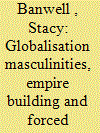

|
|
|
|
|
| Summary/Abstract |
Adopting a transnational feminist lens and using a political economy approach, this article addresses both the direct and indirect consequences of the 2003 war in Iraq, specifically the impact on civilian women. Pre-war security and gender relations in Iraq will be compared with the situation post-invasion/occupation. The article examines the globalised processes of capitalism, neoliberalism and neo-colonialism and their impact on the political, social and economic infrastructure in Iraq. Particular attention will be paid to illicit and informal economies: coping, combat and criminal. The 2003 Iraq war was fought using masculinities of empire, post-colonialism and neoliberalism. Using the example of forced prostitution, the article will argue that these globalisation masculinities – specifically the privatisation agenda of the West and its illegal economic occupation – have resulted in women either being forced into the illicit (coping) economy as a means of survival, or trafficked for sexual slavery by profit-seeking criminal networks who exploit the informal economy in a post-invasion/occupation Iraq.
|
|
|
|
|
|
|
|
|
|
|
|
|
|
|
|
| 5 |
ID:
139014
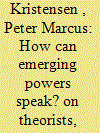

|
|
|
|
|
| Summary/Abstract |
Emerging powers like China, India and Brazil are receiving growing attention as objects in International Relations (IR) discourse. Scholars from these emerging powers are rarely present as subjects in mainstream IR discourse, however. This paper interrogates the conditions for scholars in emerging powers to speak back to the mainstream discipline. It argues, first, that ‘theory speak’ is rare from scholars based in periphery countries perceived to be ‘emerging powers’. Despite increasing efforts to create a ‘home-grown’ theoretical discourse in China, India and Brazil, few articles in mainstream journals present novel theoretical frameworks or arguments framed as non-Western/Southern theory or even as a ‘Chinese school’ or ‘Brazilian concepts’. Second, scholars from emerging powers tend to speak as ‘native informants’ about their own country, not about general aspects of ‘the international’. Third, some scholars even speak as ‘quasi-officials’, that is, they speak for their country.
|
|
|
|
|
|
|
|
|
|
|
|
|
|
|
|
| 6 |
ID:
139021
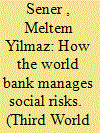

|
|
|
|
|
| Summary/Abstract |
This paper aims to assess the World Bank’s social risk management approach to poverty by focusing on the implementation details of the Social Risk Mitigation Project in Turkey, a World Bank project that depends on this approach. The paper looks at the approach through the concept of neoliberal governmentality, as an attempt to produce responsible poor citizens during a period when the responsibility for providing social services is transferred to the market and the family. By using field research it demonstrates that, with the intervention of local factors, several unintended consequences emerge in the implementation of a social risk management project. The article concludes that these outcomes, although not planned or intended, have all been instrumental in depoliticising poverty and the poor in the country. Moreover, in spite of all the problems and dissatisfaction, thanks to the Bank’s own portrayal, this project has contributed to the image of the Bank as a development institution that achieves successes in its fight with poverty.
|
|
|
|
|
|
|
|
|
|
|
|
|
|
|
|
| 7 |
ID:
139020
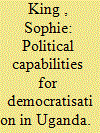

|
|
|
|
|
| Summary/Abstract |
Opinion is divided about the capacity of civil society organisations (CSOs) to enhance the political capabilities of disadvantaged groups in neo-patrimonial contexts, and particularly through a hegemonic paradigm which seeks to advance poverty reduction through good governance. Drawing on a qualitative study of CSOs in western Uganda, this paper argues that strategies focused on increasing the participation of rural citizens in formal decentralised planning spaces may be less effective in enhancing their political capabilities than those facilitating social mobilisation through the formation of producer groups and federations. This has important implications for thinking and practice around popular empowerment in sub-Saharan Africa.
|
|
|
|
|
|
|
|
|
|
|
|
|
|
|
|
| 8 |
ID:
139023
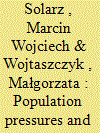

|
|
|
|
|
| Summary/Abstract |
This article examines the relationship between the populations of the more and less developed societies between the first century and 2100. Such an analysis reveals a changing dependency between the level of development (and GDP) achieved and population numbers between the first century and 1998. In relation to the past the article suggests a dynamic model for dividing the world into more and less developed areas. In relation to the present and the future it bases the population analysis on the developmental division of the world as published by one of the co-authors of this article. The article largely uses population estimates (with those referring to the past taken from Angus Maddison and those referring to the future from the most recent projections by the United Nations). Taking the 2013 UN projection as a model, it discusses three variants for demographic development in the North and South up to 2100. It argues that the more restrictive population growth variants of the UN projection predict a greater relative ‘Third Worldisation’ of the world than does the most dynamic projection.
|
|
|
|
|
|
|
|
|
|
|
|
|
|
|
|
| 9 |
ID:
139015


|
|
|
|
|
| Summary/Abstract |
Women and girls are currently positioned as highly visible subjects of global governance and development, from the agendas of the United Nations and the World Bank to the corporate social responsibility campaigns of Nike, Goldman Sachs and Coca Cola. This paper examines the representations of empowerment in visual (image and video) material from the Nike Foundation’s ‘Girl Effect’ campaign. Drawing on the works of Angela McRobbie and Lilie Chouliaraki, I suggest that this campaign is reflective of a mode of ‘post-feminist spectatorship’ that is now common to corporatised development discourses; it is manifested both in terms of the conservative mode of neoliberal empowerment proposed for distant others and the mode of ironic spectatorship imagined for the viewer. I conclude that the relations constructed in the ‘Girl Effect’ campaign between the (empowered) Western spectator and the (yet-to-be-empowered) Third World Girl work to erode bonds of solidarity and entrench structural inequalities by positioning economically empowered girls as the key to global poverty eradication.
|
|
|
|
|
|
|
|
|
|
|
|
|
|
|
|
| 10 |
ID:
139017
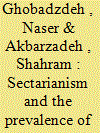

|
|
|
|
|
| Summary/Abstract |
The current sectarian conflicts in the Middle East did not arise solely from renewed geopolitical rivalries between regional powers. They are also rooted in a solid, theological articulation proposed by classic Islamic political theology. The exclusivist approach, which is a decisive part of the political, social and religious reality of today’s Middle East, benefits from a formidable theological legacy. Coining the notion of ‘othering theology’, this paper not only explores the ideas of leading classical theologians who have articulated a puritanical understanding of faith, but also explicates the politico-historical context in which these theologians rationalised their quarrels. Given the pervasive presence of these theologies in the contemporary sectarian polemics, the study of classical othering theology is highly relevant and, indeed, crucial to any attempt to overcome sectarianism in the region.
|
|
|
|
|
|
|
|
|
|
|
|
|
|
|
|
|
|
|
|
|